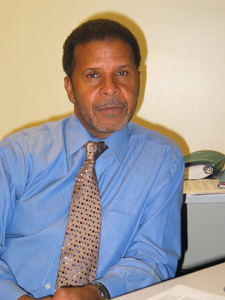 |
David Grandison, M.D., Ph.D. |
“One of the greatest issues facing health care professionals is the development of interventions and prevention strategies to reduce and eventually eliminate health disparities,” said David Grandison, M.D., Ph.D., director of UNMC’s Center for Reducing Health Disparities.
The newly formed center, which is part of the College of Public Health, combines the former Community Partnership program with the Minority Health Education Research program.
The Center for Reducing Health Disparities’ mission is to improve public health and the quality of health and wellness of racial/ethic minorities, rural and underserved populations by reducing and ultimately eliminating health disparities.
The center will focus on cancer, cardiovascular disease, diabetes, behavioral health, childhood wellness and obesity through research, community engagement and community education.
One way to address those health care concerns is through UNMC’s effective involvement with the North and South Omaha Community Care Councils. Both councils have a presence in their respective communities and through them partnerships have been forged with other agencies to address the special health concerns of the north and south Omaha populations.
UNMC also operates health clinics in both north and south Omaha. Health providers who work out of these clinics said engaging with and educating the community often requires a non-traditional approach.
“People can feel vulnerable when seeking out health care,” said Wayne Houston, community liaison in north Omaha. “They don’t know the questions to ask health professionals and therefore don’t engage in the process.”
In south Omaha, staff notes other concerns.
|
|
Repairing trust, building and strengthening relationships with the community and educating community members about preventative health care measures is just one aspect of the clinic work.
The Center for Reducing Health Disparities also seeks to provide services that facilitate research, including consultation on research involving underserved minority populations, recruitment of study participants and Spanish translation of IRB approved research documents.
“Some diseases affect people with diverse racial and ethnic backgrounds and cultures differently,” Dr. Grandison said. “Therefore, it is important that we include diverse racial and ethnic populations in research studies to evaluate effective disease management and treatment.”
Encouraging research participation isn’t always easy and it can take time for some individuals to overcome negative perceptions about research and to see the potential value of participating in research. Minority participation in research is another important strategy in reducing health disparities by increasing access to potentially life-saving and life-changing healthcare discoveries.
The Center for Reducing Health Disparities already is seeing success.
“Through a partnership with Eppley Cancer Center, African American men have been screened for prostate cancer at several community health fairs,” said Ira Combs, community clinical liaison. “It resulted in the discovery of four men with stage one cancer. All were treated and are alive today.”
The center seeks to be a positive force for change and build upon the resources at UNMC fostering research, community engagement opportunities and education that only benefits the institution but also the communities which we serve.
For more information on the Center for Reducing Health Disparities, contact Athena Ramos, program coordinator, at 559-2095 or aramos@unmc.edu.